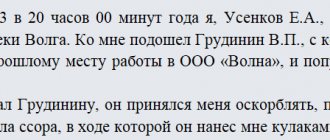1. Criminal cases for crimes specified in part two of Article 20 of this Code are initiated against a specific person by filing an application to the court by the victim or his legal representative, except for the cases provided for in paragraph 2 of part one and part four of Article 147 of this Code.
2. In the event of the death of the victim, a criminal case is initiated by filing an application by his close relative or in the manner established by part three of this article.
3. A criminal case is initiated by an investigator, as well as, with the consent of the prosecutor, by an inquiry officer in the cases provided for in part four of Article 20 of this Code. In this case, the investigator begins the preliminary investigation, and the interrogator begins the inquiry.
4. The entry of a prosecutor into a criminal case does not deprive the parties of the right to reconciliation.
5. The application must contain: 1) the name of the court to which it is submitted; 2) a description of the crime event, place, time, as well as the circumstances of its commission; 3) a request addressed to the court to accept the criminal case for proceedings; 3.1) information about the victim, as well as documents proving his identity; 4) information about the person brought to criminal liability; 5) a list of witnesses who must be summoned to court; 6) signature of the person who submitted it.
6. The application is submitted to the court with copies according to the number of persons against whom a criminal case of private prosecution is being initiated. The applicant is warned of criminal liability for knowingly false denunciation in accordance with Article 306 of the Criminal Code of the Russian Federation, about which a note is made in the application, which is certified by the signature of the applicant. At the same time, the magistrate explains to the applicant his right to reconciliation with the person against whom the application was filed.
7. From the moment the court accepts the application for its proceedings, on which a decision is made, the person who filed it is a private prosecutor. The rights provided for in Articles 42 and 43 of this Code must be explained to him, about which a protocol is drawn up, signed by the judge and the person who filed the application.
8. If, after accepting the application for proceedings, it is established that the victim, due to a dependent or helpless state or for other reasons, cannot defend his rights and legitimate interests, then the magistrate has the right to recognize the participation in the case of the legal representative of the victim and the prosecutor as mandatory.
Supporting the applicant’s positions in private prosecution cases
This Personal Data Privacy Policy (hereinafter referred to as the “Policy”, “Privacy Policy”) applies to all information that Ramki Zakon LLC (hereinafter referred to as the “Company”) can obtain about the User while using the website located at: https ://lawforyou.ru/, as well as services, services, programs, products or services, and during the execution by the Company of any agreements and contracts with the User, including the possibility of sending information, including advertising (hereinafter referred to as “Use”).
Use of the Company’s services means the User’s unconditional consent to this Policy and the conditions for processing his personal information specified therein; in case of disagreement with these conditions, the User must refrain from use.
The Company assumes that the User who initiates Use consciously determines his requests and controls the technical parameters of the equipment he uses, and has also familiarized himself with this Policy in full. If the User disagrees with the Policy, Use must be terminated.
1. GENERAL PROVISIONS
1.1. Within the framework of this Policy, the User’s personal information means:
1.1.1. Personal information that the User provides about himself independently during registration (creating an account/personal account) or in the process of participating in the Use, including the User’s personal data. Information required for the provision of Services is marked in a special way. Other information is provided by the User at his discretion.
1.1.2. Data that is automatically transmitted as a result of the User’s Use using software installed on the User’s device, including IP address, cookie data, information about the User’s browser (or other program through which services are accessed), technical characteristics of the equipment and software used by the User, date and time of access to services, addresses of requested pages and other similar information.
1.1.3. Other information about the User, the processing of which is provided for in the Agreement for the use of the Site and/or the possible receipt of which is technically determined.
1.1.4. This Privacy Policy applies only to the Site https://lawforyou.ru/. The Company does not control and is not responsible for third party sites, which the User can access via links available on the Site https://lawforyou.ru/.
2. PURPOSES OF PROCESSING USERS’ PERSONAL INFORMATION
2.1. The Company collects and stores only that personal information that is necessary to provide/receive Use, including the execution of agreements and contracts with the User, except in cases where the law provides for mandatory storage of personal information for a period specified by law.
2.2. The Company processes the User’s personal information for the following purposes:
2.2.1. Identification of the User, within the framework of Use, for processing requests, execution of agreements and contracts with the Company.
2.2.2. Providing the User with the opportunity for personalized Use and execution of agreements and contracts;
2.2.3. Establishing feedback with the User, including sending notifications, requests regarding Use, execution of agreements and contracts, provision of services, processing requests and applications from the User, including possible mailings of informational and advertising nature;
2.2.4. Improving the quality of Use, convenience, developing new features and options for Use;
2.2.5. Targeting of advertising materials;
2.2.6. Conducting statistical and other studies based on anonymized data;
2.2.7. Creating an account if the User has given consent (including through his/her implied actions) to create an account.
2.2.8. Providing the User with effective customer and technical support if problems arise related to the use of the Site.
3. CONDITIONS FOR PROCESSING USERS’ PERSONAL INFORMATION AND ITS TRANSFER TO THIRD PARTIES
3.1. With regard to the User's personal information, its confidentiality is maintained, except in cases where the User voluntarily provides information about himself for general access to an unlimited number of persons. When using certain Use options, the User agrees that a certain part of his personal information becomes publicly available.
3.2. The Company has the right to transfer the User’s personal information to third parties in the following cases:
3.2.1. The user agreed to such actions.
3.2.2. The transfer is necessary for the User to use a certain service or to fulfill a certain agreement or contract with the User.
3.2.3. The transfer is provided for by Russian or other applicable legislation within the framework of the procedure established by law.
3.2.4. Such a transfer occurs as part of the sale or other transfer of a business (in whole or in part), and all obligations to comply with the terms of this Policy in relation to the personal information received by him are transferred to the acquirer;
3.2.5. In order to ensure the possibility of protecting the rights and legitimate interests of the Company or third parties in cases where the User violates the provisions of the current legislation of the Russian Federation in this area, or documents containing the conditions for using specific options of Use, as well as this document;
3.2.6. As a result of processing the User's personal information by depersonalizing it, anonymized statistical data may be obtained, which is transferred to a third party to conduct research, perform work or provide services on behalf of the Company.
3.3. The processing of the User's personal data is carried out without a time limit in any legal way, including in personal data information systems using automation tools or without the use of such tools. The processing of Users’ personal data is carried out in accordance with Federal Law dated July 27, 2006 N 152-FZ “On Personal Data”.
3.4. In case of loss or disclosure of personal data, the Company informs the User about the loss or disclosure of personal data.
3.5. The Company takes the necessary organizational and technical measures to protect the User’s personal information from unauthorized or accidental access, destruction, modification, blocking, copying, distribution, as well as from other unlawful actions of third parties.
3.6. The Company, together with the User, takes all necessary measures to prevent losses or other negative consequences caused by the loss or disclosure of the User’s personal data.
4. OBLIGATIONS OF THE PARTIES
4.1. The user is obliged:
4.1.1. Provide information about personal data necessary for Use.
4.1.2. Update and supplement the provided information about personal data if this information changes.
4.2. The society is obliged:
4.2.1. Use the information received solely for the purposes specified in this Privacy Policy.
4.2.2. Ensure that confidential information is kept secret, not disclosed without the prior written permission of the User, and also not sell, exchange, publish or disclose in other possible ways the transferred personal data of the User, except as provided for in this Privacy Policy.
4.2.3. Take precautions to protect the confidentiality of the User's personal data in accordance with the procedure generally used to protect this type of information in existing business transactions.
4.2.4. Block personal data relating to the relevant User from the moment of application or request from the User or his legal representative or the authorized body for the protection of the rights of personal data subjects for the period of verification in the event of detection of unreliable personal data or unlawful actions.
4.3. The user can at any time change (update, supplement) the personal information provided by him or part of it, and can also delete the personal information provided by him within a certain account.
4.4. The rights provided for in paragraphs.
4.3. of this Policy may be limited in accordance with legal requirements. In particular, such restrictions may provide for the obligation of the Company to retain information changed or deleted by the User for a period established by law, and to transfer such information in accordance with the legally established procedure to a government agency.
5. PROCESSING OF PERSONAL INFORMATION USING COOKIES AND COUNTERS
5.1. Cookies available on the User's equipment for any reason may be used by the Company to provide the User with personalized usage options, to target/distribute information/advertising that is shown to the User, for statistical and research purposes, as well as to improve Usage options.
5.2. The User understands that the equipment and software used for Use may have the function of prohibiting operations with cookies (for any sites or for certain sites), as well as deleting previously received cookies.
5.3. The Company has the right to establish that the provision of certain Use options is possible only on the condition that the acceptance and receipt of cookies is permitted by the User.
5.4. The structure of the cookie file, its content and technical parameters are determined at the discretion of the Company and may be changed without prior notice to the User.
5.5. Counters placed by the Company during Use can be used to analyze the User's cookies, to collect and process statistical information and for other purposes. Technical parameters of the meters are determined by the Company and may be changed without prior notice to the User.
6. MEASURES USED TO PROTECT THE USER'S PERSONAL INFORMATION
6.1. The Company takes necessary and sufficient organizational and technical measures to protect the User’s personal information from unauthorized or accidental access, destruction, modification, blocking, copying, distribution, as well as from other unlawful actions of third parties with it.
6.2. The Company uses information from the User’s profile (login and password) to authorize access to the Use. The User is responsible for the safety of this information, including login and password. Any actions performed using it are considered by the Company to have been performed by the User. Transferring the user's own login and password to third parties is prohibited. If the User becomes aware of the login and password of another user, as well as other confidential information about the latter, he is obliged to notify the Company about this and not use the specified information that has become known to him.
6.3. The User's access to the Use may involve accessing third party Internet resources and downloading from them program code and/or graphic objects (including those invisible when the browser displays Internet pages) used for advertising purposes and for collecting statistics. The owners of these resources have the technical ability to collect information about the User and independently determine the conditions for its use. By configuring the software, the User has the ability to block requests for graphic images hosted on third-party servers, however, this may lead to loss of readability and errors when displaying resources. When users move from the Company's Use pages to the pages of Internet resources of third parties, the User independently determines the limits of the use of information about them within the framework of the conditions and rules determined by the owners of the relevant Internet resources.
6.4. The Company's Internet resources may contain links to resources of third parties to which this document does not apply. The Company is not responsible for the actions of third parties using the Company’s Internet resources in their activities.
6.5. Ensuring the security of the User's personal data is achieved by monitoring to identify threats to the security of personal data during their processing; application of organizational and technical measures to ensure the security of personal data during their processing; by assessing the effectiveness of measures taken to ensure the security of personal data; by detecting facts of unauthorized access to Personal Data and taking measures to eliminate them; by establishing rules for access to personal data; by monitoring the measures taken to ensure the security of personal data.
7. CHANGES TO THE PRIVACY POLICY. APPLICABLE LAW
7.1. The Company has the right to unilaterally make changes to this Privacy Policy at any time.
7.2. The new Privacy Policy comes into force from the moment it is posted on the Site, unless otherwise provided by the new edition of the Privacy Policy.
7.3. This Policy and the relationship between the User and the Company arising in connection with the application of the Privacy Policy are subject to the law of the Russian Federation.
8. RIGHTS AND OBLIGATIONS OF THE PARTIES
8.1. The Site user has rights determined by the provisions of the current legislation of the Russian Federation.
8.2. When visiting and using the Company’s Internet resources, the User is obliged to: comply with the provisions of the current legislation of the Russian Federation and this document; compensate for losses incurred by the Company, other Users or third parties as a result of violation of the Policy or the legislation of the Russian Federation; comply with the provisions of the documents governing the Use, as well as the legislation of the Russian Federation; familiarize yourself with all legal information posted on the Site or accessible on it through links.
8.3. When using, the User is prohibited from: publishing and distributing any information that:
- contains threats, discredits, insults, discredits honor and dignity or business reputation or violates the privacy of other Site Users or third parties;
- violates the rights of minors;
- is obscene, contains obscene language, contains pornographic images and texts or scenes of a sexual nature involving minors;
- contains scenes of violence or inhumane treatment of animals;
- contains a description of the means and methods of suicide, any incitement to commit it;
- promotes and/or contributes to the incitement of racial, religious, ethnic hatred or enmity, promotes fascism or the ideology of racial superiority; contains extremist materials;
- promotes criminal activity or contains advice, instructions or guidelines for committing criminal acts;
- contains restricted information, including, but not limited to, state and commercial secrets, information about the private life of third parties;
- contains advertising or describes the attractiveness of drug use, information about the distribution of drugs, recipes for their manufacture and advice on use; is fraudulent;
- violates the rights of third parties to the results of intellectual activity;
- violates the rights of personal data subjects;
- violates other rights and interests of citizens and legal entities or the requirements of the legislation of the Russian Federation.
8.4. The user is prohibited from:
- carry out mass mailings of messages;
- use software and carry out actions aimed at disrupting the normal functioning of the technical capabilities and equipment of the Company;
- publish and distribute on the Site or otherwise use viruses, Trojan horses and other malicious programs;
- post commercial and political advertising on the Site;
- carry out other actions that may harm the Company, third parties, and Users.
9. DISPUTE RESOLUTION
9.1. Before filing a claim in court regarding disputes arising from the relationship between the User and the Company, it is mandatory to submit a claim (a written proposal for a voluntary settlement of the dispute).
9.2. The recipient of the claim, within 15 calendar days from the date of receipt of the claim, notifies the claimant in writing of the results of consideration of the claim.
9.3. If an agreement is not reached, the dispute will be referred to the Dzerzhinsky District Court of St. Petersburg or the Arbitration Court of St. Petersburg and the Leningrad Region in accordance with the current legislation of the Russian Federation.
10. ADDITIONAL TERMS
10.1. Any suggestions or questions regarding this Privacy Policy should be reported to
10.2. The current Privacy Policy is posted on the page at: https://lawforyou.ru
10.3. This Privacy Policy is an integral part of the Agreement for the use of the Site, located on the page at: https://lawforyou.ru/
The Constitutional Court changed the grounds for dismissing the case due to the failure of the private prosecutor to appear
On April 15, the Constitutional Court published a ruling on the complaint of Anna Tikhomolova, who was unable to obtain an acquittal in the beating case. Due to the failure of the private prosecutor to appear, it was terminated due to the lack of evidence of a crime, despite the objections of the accused. The Constitutional Court recognized that the relevant norms of the Criminal Procedure Code contradict the Basic Law.
- Those accused under articles excluded from the Criminal Code will be allowed to acquit themselves
February 2, 10:42 - The Constitutional Court prohibited ignoring the accused when terminating a criminal case
October 16, 16:51
In 2015, a criminal case was opened against Anna Tikhomolova for beatings (Article 116 of the Criminal Code). In 2016, the magistrate discontinued proceedings in the case, since in the new version of this article the charge against the woman ceased to be criminal. Tikhomolova herself objected to this, as she wanted to achieve an acquittal.
In 2022, the Constitutional Court examined her complaint and recognized that the court does not have the right to dismiss the case if the accused protests. If he objects to the termination of the case due to the decriminalization of the article, the court is obliged to consider the case on its merits within the framework of the private prosecution procedure and either issue an acquittal or terminate the criminal case on the specified grounds. The Constitutional Court, by its resolution, canceled the previously adopted decisions in the Tikhomolova case and sent it for a new consideration.
But in September 2022, the magistrate court again dismissed the case for lack of evidence due to the failure of the private prosecutor to appear. Part 3 art. 249 of the Code of Criminal Procedure provides for the termination of private prosecution cases if the prosecutor fails to appear without good reason. Higher authorities confirmed this decision and ignored Tikhomolova’s objections that there was no crime in her case.
In this regard, the applicant asked the Constitutional Court to check for compliance with the Basic Law, Part 3 of Art. 249 of the Criminal Procedure Code in connection with Part 4 of Art. 321 of the same code on the consideration of private prosecution cases, paragraph 2, part 1, art. 24 of the Code of Criminal Procedure on the termination of the case for lack of corpus delicti and Part 2 of Art. 27 of the Code of Criminal Procedure, which does not provide for refusal to terminate the case if the accused disagrees. According to Tikhomolova, taken together, these norms violate the constitutional guarantees of equality before the court, the right to protection of honor and good name, the right to judicial protection and competitiveness in legal proceedings.
The Constitutional Court indicated that the court is obliged to ensure the adoption of a lawful, well-founded and fair decision and to examine the circumstances of the case on the merits for this purpose. He does not have the right to limit himself to establishing formal conditions for the application of the norm - this violates the right of citizens to judicial protection.
The Code of Criminal Procedure will clarify the procedure for compensation of procedural costs
The Constitutional Court also indicated that the absence of a crime is not the same as the absence of its elements. This is a broader concept, implying that there are not even prerequisites for investigating the issue of the existence of a crime. The same applies to the non-involvement of a particular person in a crime. In this regard, the termination of a case due to the absence of elements or events of a crime has different legal consequences.
By dismissing a case due to the failure of a private prosecutor to appear or his refusal to charge, the court is deprived of the legal opportunity to verify the factual and legal validity of the charge. At the same time, the accuser himself is not obliged to in any way motivate his reluctance to support the accusation. Since if the prosecutor fails to appear, the court cannot verify the circumstances of the case, it can be terminated only due to the absence of corpus delicti. Thus, part 3 of Art. 249 of the Code of Criminal Procedure creates the preconditions for the emergence of negative consequences of a criminal record for a citizen who in other circumstances could be completely acquitted, the Constitutional Court believes. This violates the defendant’s right to effective judicial protection, and the prosecutor and the accused find themselves in an unequal position.
Thus, the Constitutional Court found that clause 2, part 1, art. 24, part 2 art. 27, 3 art. 249 and paragraph 2 of Art. 254 of the Code of Criminal Procedure contradict the Basic Law to the extent that the failure of a private prosecutor to appear automatically entails the termination of the case for lack of corpus delicti. The Constitutional Court obliged the federal legislator to make changes that would eliminate this legal gap. Until then, the Constitutional Court ruled that the failure of a victim in a private prosecution case to appear in court without valid reasons is grounds for termination of the criminal case due to the absence of a crime.
The Constitutional Court also overturned the decisions in the case of Anna Tikhomolova and decided to reconsider it.
- Pravo.ru
- constitutional Court




